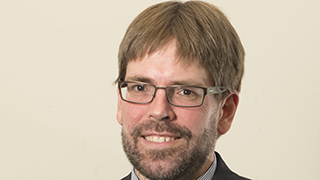Q&A with Peter Shoemaker, Dean of the College of Arts and Sciences
Tuesday, August 23rd, 2016

Peter Shoemaker, Ph.D., comes to Seton Hall from The Catholic University of America, where he served as Vice Provost and Dean of Undergraduate Studies, Director of the University Honors Program and Associate Professor of French. During his time there, he was instrumental in developing programs designed to improve the retention of first-year students. He was also responsible for reviewing the general education curriculum and assessing student learning outcomes. In addition, Dean Shoemaker worked collaboratively with faculty, staff and students to develop a sustainability program and agenda that included an experiential component for students.
Prior to joining The Catholic University of America in 2000, Dean Shoemaker taught at Macalester College and Princeton University, having received both his M.A. and his Ph.D. from the latter.
What attracted you to Seton Hall and drew you to apply for the position as dean of
the College of Arts and Sciences?
I obviously knew about Seton Hall’s reputation, both in academics and athletics. When
I started doing research on the University, it became immediately clear that it was
an institution on the rise.
What was your reaction when you learned you had been selected to be the next A&S dean?
It all happened quite suddenly. I guess that I was stunned, first, then flattered,
and then a little bit intimidated by the scope of the job.
What challenges do the liberal arts face today, and how do you plan to address those
challenges?
The liberal arts get a bad rap. The reality, however, is that liberal arts majors
are highly employable, and that liberal arts still have a critical role to play in
society. The other day, someone sent me a poster with the caption: “Science can tell
you how to clone a Tyrannosaurus Rex; Humanities can tell you why this might be a
bad idea.” I believe that it’s critical that universities, and especially Catholic
universities, engage not only with practical knowledge, but also with values; we do
both in the College of Arts and Sciences. I also think that we need to communicate
more effectively with students and parents about the value of the liberal arts. One
way to do this is to tell the stories of our successful liberal arts majors—how they
are inventing new career paths, transforming their communities and living meaningful
lives.
Where would you like to see the College in ten years?
My hope is that the College will be a leader in liberal arts education. In my mind,
this means an increased focus on cross-disciplinary work, a more international perspective,
a continuing commitment to social justice and a willingness to push the boundaries
of dynamic, active learning (such as undergraduate research and service learning).
What about French culture and literature intrigues/fascinates you the most?
For me, the French embody a way of thinking that is also a way of life. The French
consume literature the way that they consume food, and vice-versa.
You spent a year studying at the Ecole Normale Supérieure in Paris. What was that
like?
It was grad student’s paradise. I could attend almost any lecture or seminar at Paris’s
many universities and research institutes, or work at the Bibliothèque Nationale (one
of the great libraries of the world), or go to the Louvre for free, or just walk around
the city.
Throughout your career, you have written journal articles and books, received such
honors as the Provost’s Award for Excellence in Teaching at The Catholic University
of America and been named a Jacob Javits Fellow. Of your many achievements, of which
are you most proud, and why?
The teaching award, without hesitation. I was recognized not only for my accomplishments
in the classroom, but also for my work in advancing international education at CUA.
I’m a big, big advocate of education abroad and languages.
Give us a glimpse of who Dean Shoemaker is outside the office. Where would people
most likely find you when you’re not at work?
These days, people would probably find me at the pool or playground with my three-year-old
son... or maybe exploring the roads of Essex, Union, and Morris Counties on my bright
orange racing bike.
What message do you have for students about why is this an exciting time to be a part
of the College of Arts and Sciences?
In the College of Arts and Sciences, you’ll find a top-notch faculty that is engaged
in cutting-edge research. But they’ll also take the time to help you discover your
passion and plan your future. Whether you’re pursuing one of our majors, or a minor,
or taking core courses, you’ll find something that’s relevant to you. And don’t think
that you need to pick a major right away; take the time to shop around and explore.






